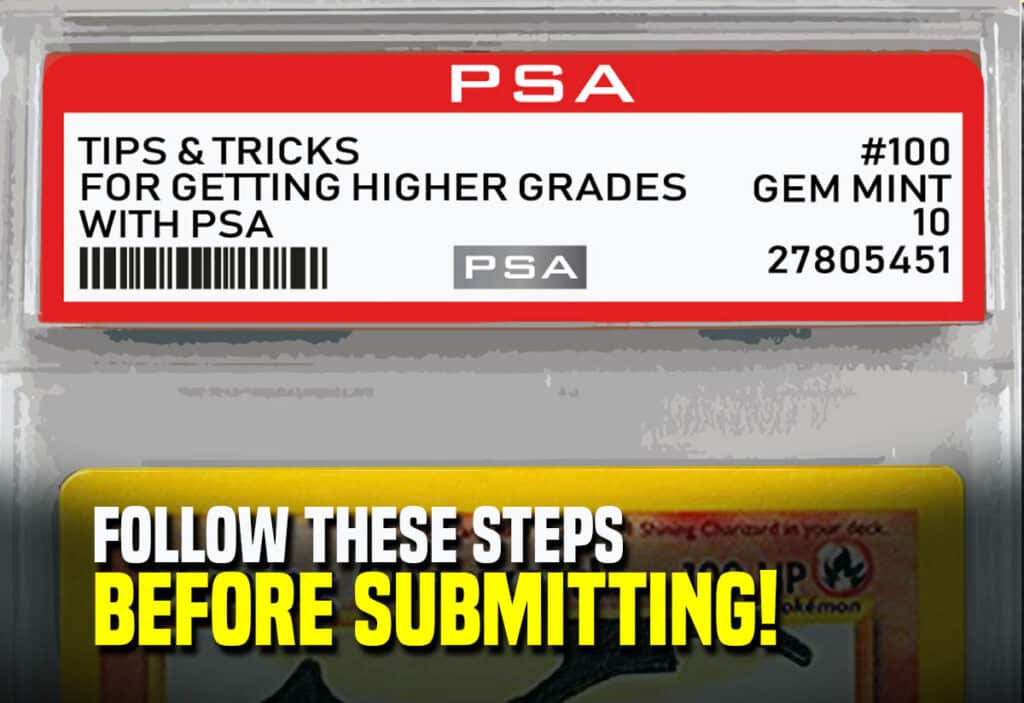As a passionate collector of trading cards, you may have come across the term “PSA grading” numerous times. But what exactly is PSA grading and why is it important? PSA, or Professional Sports Authenticator, is a leading third-party grading service that evaluates and assigns a numerical grade to collectible cards. This grading process provides collectors with an objective assessment of the condition and authenticity of their cards. In this article, I will guide you through the world of PSA grading, explaining its benefits, factors to consider, and how to prepare your cards for grading.
Why should you get your cards graded?
You might be wondering why you should bother getting your cards graded in the first place. Well, PSA grading offers a multitude of advantages for collectors. Firstly, it provides an unbiased and standardized assessment of your cards’ condition. This is particularly crucial when buying or selling cards, as the graded condition determines their value. Additionally, PSA-graded cards are securely encased in a protective holder, safeguarding them from damage and preserving their condition over time. Lastly, having your cards graded adds credibility to your collection and enhances its overall appeal.

The Benefits of PSA Card Grading
- Increased value of graded cards: A higher grade often translates to a higher selling price, allowing you to maximize your investment.
- Provides a clear and universally recognized standard for card condition: This can be especially helpful when trading or purchasing cards, as both parties can have confidence in the accuracy of the graded card’s condition.
- Identify counterfeit or altered cards: PSA’s expertise in card authentication ensures that the cards you own are genuine, giving you peace of mind and protecting you from potential scams.
- Having a higher level of demand among collectors: It can make it easier for you to sell or trade your graded cards, as you are seen as more desirable and trustworthy.
Important factors to consider before getting your cards graded
Before you jump into the world of PSA grading, there are a few important factors to consider. Firstly, it’s essential to evaluate the condition of your cards. PSA grading is primarily based on the physical condition of the card, including factors such as corners, edges, centering, and surface quality. If your cards are in poor condition or have significant damage, they may not receive a high grade, and the grading process may not be worth the investment.
Secondly, you should be aware of the potential cost of PSA grading. The pricing for grading services can vary depending on the type of card and the desired turnaround time. It’s important to research and understand the costs involved before submitting your cards for grading. Additionally, you should also consider the sentimental value of your cards. If you have cards that hold significant personal meaning, you might want to carefully weigh the benefits of grading against the potential risks of damage during the process.
Lastly, it’s crucial to find a reliable PSA grading service near you. Look for reviews and recommendations from fellow collectors, and ensure that the service you choose has a good reputation for accuracy and customer satisfaction.
Understanding the PSA grading scale
To fully comprehend the PSA grading process, it’s important to understand the grading scale used by PSA. The PSA grading scale ranges from 1 to 10, with 10 being the highest grade. Each numerical grade corresponds to a specific level of condition, with detailed criteria for different aspects of the card, such as surface, corners, edges, and centering. A card graded 10 is considered to be in pristine condition, while a card graded 1 has significant wear and damage. Understanding this scale will help you interpret the grades assigned to your cards and determine their market value.
How to prepare your cards for PSA grading
Properly preparing your cards before submitting them for PSA grading is crucial to ensure the best possible outcome. These are the important things you should not miss out:

Handle with care: It’s important to handle your cards with care, using clean hands or gloves to prevent any smudges or fingerprints.
Examine your Cards: Carefully examine your cards under good lighting to identify any potential flaws or imperfections. It’s also recommended to use a magnifying glass or loupe to get a closer look at the card’s condition.
Consider using card sleeves or holders – The use of card sleeves or holders can protect them during the submission process. This will help prevent any accidental damage or wear while handling.
Organize and document your cards- keeping track of their condition and any relevant details. This will make it easier for you to fill out the submission forms accurately and provide the necessary information to the grading service.
The Cost of PSA Grading and Available Options
The cost of PSA grading can vary depending on several factors, including the type of card, the desired turnaround time, and any additional services you may require. PSA offers different service levels, ranging from standard to express, with varying processing times and fees. The standard service is typically the most affordable option, but it may take several months to receive your graded cards. If you require a faster turnaround time, you can opt for the express or super express services, which come with higher fees.
In addition to the grading fees, you should also consider any additional services you may want to include, such as card autograph authentication or card encapsulation. These services can add to the overall cost but may be beneficial depending on your specific needs and goals. It’s important to carefully review the available options and their associated costs before making a decision.
Reliable PSA Grading Service Near You
When it comes to choosing a PSA grading service, it’s essential to find a reliable and trustworthy provider. While PSA is one of the most well-known and respected grading companies, there are also other reputable options available. Conducting thorough research and reading reviews from fellow collectors can help you find a service that meets your needs and provides accurate and timely results.
In addition to online options, you may also find local card shops or conventions that offer PSA grading services. This can be a convenient option, as it allows you to personally interact with the service provider and discuss any specific requirements or concerns you may have. However, regardless of whether you choose an online or local service, it’s crucial to verify their reputation and ensure they have a track record of delivering reliable and accurate grading results.
If you’re looking for a reliable PSA grading service in Australia, look no further than Dark Wolf Collectibles. It’s a company that offers middle-man services to help collectors get their cards graded through PSA. They act as a liaison between the collector and PSA, handling all the necessary paperwork and logistics to get the cards graded. The process is straightforward, and collectors can rest assured that their cards are in good hands.
You may also read the blog post titled, “How to Get Your Cards Graded By PSA in Australia” and discover the step-by-step process for getting your trading cards graded by PSA in Australia through Dark Wolf Collectibles.
Tips in Submitting Your Cards for PSA Grading
Once you have chosen a PSA grading service and prepared your cards, it’s time to submit them for grading. Here are some tips to help you navigate the submission process successfully:
Read and follow the submission guidelines provided by the grading service carefully. This will ensure that you include all the necessary information and documents required for the grading process.
Double-check the accuracy of your submission forms and make sure all information is filled out correctly. Any errors or missing details can cause delays or complications.
Consider insuring your cards during transit to protect them from loss or damage. Graded cards can have significant value, and insurance provides extra peace of mind.
Keep track of your submission using the tracking number provided by the shipping carrier. This will allow you to monitor the progress of your submission and ensure its safe arrival.
Be patient. PSA grading can take time, especially during peak periods. It’s important to understand that the process is meticulous and thorough, ensuring accurate and reliable results.
The process of PSA grading and what to expect
Once your cards have been submitted for PSA grading, they will go through a detailed evaluation process. This process typically involves multiple stages, including card examination, grading, encapsulation, and labeling. Each stage is conducted by highly trained and experienced professionals to ensure accuracy and consistency in the grading results.
During the examination stage, the card is carefully inspected for any flaws, wear, or damage. The grader will assess various aspects of the card, such as corners, edges, centering, and surface quality, to determine its overall condition. This assessment is done using specific grading criteria provided by PSA.
Following the examination, the grader will assign a numerical grade to the card based on its condition. The card will then be encapsulated in a tamper-evident holder to protect it from further damage and preserve its condition. The holder will also display the card’s grade and any additional information, such as autograph authentication.
Once the encapsulation is complete, the card will be labeled with a unique certification number and a hologram seal to verify its authenticity. The certification number can be used to verify the card’s grade and authenticity through PSA’s online database.
Common mistakes to avoid when getting your cards graded
When getting your cards graded, it’s important to avoid common mistakes that could potentially impact the grading outcome. One of the most common mistakes is mishandling the cards during the preparation process. Failing to handle the cards with care can result in smudges, fingerprints, or accidental damage, which may lower the card’s grade.
Another common mistake is submitting cards that are not suitable for grading. Cards with significant damage, such as creases, tears, or water damage, may not receive a high grade and may not be worth the grading fees. It’s important to carefully evaluate the condition of your cards before deciding to get them graded.
Lastly, it’s crucial to thoroughly research and choose a reputable grading service. There have been instances of counterfeit grading labels or altered grades, which can potentially devalue your cards. By choosing a trusted and well-established grading service, you can minimize the risk of encountering such issues.
Conclusion and final thoughts
PSA grading is an essential aspect of the trading card collecting hobby. It provides collectors with an objective assessment of their cards’ condition and authenticity, enhances their value, and adds credibility to their collection. By understanding the benefits of PSA grading, considering important factors, and following the proper preparation and submission process, you can ensure a successful grading experience. Whether you collect sports cards or Pokemon cards, PSA grading offers a trusted and recognized standard for assessing and preserving the quality of your cards. So, unlock the secrets of PSA grading and take your card collection to the next level! Start the journey to enhancing your collection today!









Add comment